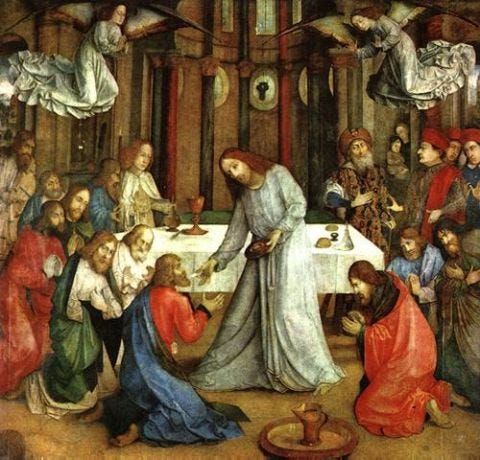Feast with the Eyes of Humility
Twentieth Sunday in Ordinary Time
This Sunday, we continue our journey through the sixth chapter of the Gospel of John. The readings expands on the teachings that Jesus introduced in last week’s liturgy. Previously, the crowd questioned how Jesus could claim to have come down from heaven, knowing him as the son of Joseph.
In today’s First Reading, we hear that the Wisdom of God has prepared a banquet. To accept this invitation, we must adopt the humility of children (cf. Matthew 18:3–4). Each Eucharist presents and renews the profound mystery of the Cross. “Before so great a sacrament, the faithful can only echo humbly and with ardent faith the words of the Centurion: "Domine, non sum dignus ut intres sub tectum meum, sed tantum dic verbo, et sanabitur anima mea" ("Lord, I am not worthy that you should enter under my roof, but only say the word and my soul will be healed.") (CCC 1386).
In Sunday’s Gospel, some struggle with Jesus’ message that he is the living bread sent by God. Jesus had previously explained that just as God provided manna to the Israelites in the desert, now God has sent a new manna to grant eternal life. We again hear the final verse from last week’s Gospel: Jesus himself is the bread from heaven; his flesh is given for the life of the world.
To the world, believing that the crucified Christ rose from the dead may seem foolish. For many, including those in Sunday’s Gospel, it might even appear absurd to accept that Jesus offers His Flesh for us to eat.
One of the challenges for those who heard but did not grasp Jesus’ message is his teaching that the bread he offers is his own flesh. This is scandolous if not properly understood. When the people argue over his words, Jesus intensifies his teaching, emphasizing that salvation comes through eating his Body and Blood. Rather than directly addressing the question of how this salvation will occur, Jesus focuses on the life he will give to the world, a truth which will only be fully understood only after his death and Resurrection.
Yet, in today’s Gospel, Jesus intensifies His message, repeatedly emphasizing the words “eat,” “drink,” “my Flesh,” and “my Blood.” John uses a particularly vivid Greek word for eating, one that originally described the “munching” of animals, to stress the tangible reality of what Jesus asks us to believe.
Paul reminds us in today’s Epistle that true wisdom begins with reverence for the Lord and the desire to live according to His will (cf. Proverbs 9:10). As the Psalmist sings, those who fear the Lord lack nothing they need.
Jesus’ words are shocking and difficult for many to accept, both then and now. However, they are crucial because they reveal our covenant bond with him.
God’s apparent foolishness surpasses human wisdom (cf. 1 Corinthians 1:18–25). In His boundless love, He chooses to save those who believe that His Flesh is true food and His Blood is true drink.
This profound mystery lies at the heart of our Eucharistic belief. In the bread and wine, Jesus’ Body and Blood are truly present. When we partake in the Eucharist, Jesus himself dwells within us. This union with the Lord makes us one body, grants us eternal life, and commissions us to be Christ for the world. We feast upon His Body that we may be His Body to the world.
Once again, the liturgy invites us to renew our faith in the Eucharist, moving beyond the limitations of what we can perceive with our senses. “by the Eucharistic celebration we already unite ourselves with the heavenly liturgy and anticipate eternal life, when God will be all in all” (CCC 1326).
We come not merely to an altar set with bread and wine, but to the banquet of Wisdom, the heavenly feast. Here, God our Savior renews His eternal covenant and promises to conquer death forever (cf. Isaiah 25:6–9). In short, “the supper which the Lord took with his disciples on the eve of his Passion… anticipates the wedding feast of the Lamb in the heavenly Jerusalem” (CCC 1329)
As Paul advises, let us make the most of our days, continually giving thanks in the Eucharist for all things, in the name of Jesus Christ, our Savior and the true Bread which comes down from heaven.
Deus Benedicat



